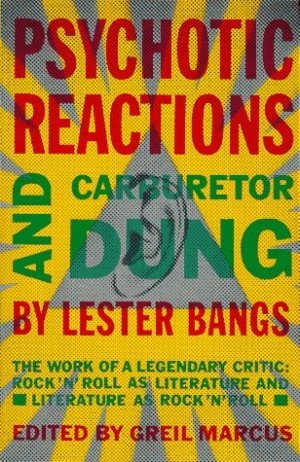
ROCK SNOB ENCYCLOPEDIA: Back in the day, Lester Bangs, Richard Meltzer and Nick Tosches formed a terrible triumvirate of rowdy, hard-living rock scribblers — angel-headed hipsters burning for the ancient heavenly connection to the starry dynamo in the machinery of rock — feared and loathed by the music industry’s power elite. They didn’t just write about rock ‘n’ roll; he lived it, drank it, smoked it, felt it up, snorted it down and puked it up all over the page the morning after.
BOING BOING: So what an incredible thrill it was to come across a 90-minute interview with Lester Bangs himself on a Bit Torrent tracker recently. To finally, at long last hear the speaking voice of one of my literary heroes – it was like having a mental orgasm. Pure joy! Bangs and the interviewer cover a lot of ground in the two part interview including the state of the music industry at the time, whether or not the Rolling Stones ought to retire (in 1980!), John Lydon’s PiL and what music Lester was listening to himself. It’s a wonderful, articulate and thoughtful interview with a great writer whose speaking voice we rarely hear. Someone at at website called The Interview Archive has posted the interview online. It’s absolutely worth listening to, a rare treat. MORE
KEN TUCKER: Rock music criticism remains, for the most part, an unknown quantity in contemporary cultural coverage. Rock critics are generally held in contempt by their high-culture counterparts, and the rock audience seems interested in little more than consumer tips – buy this record, don’t buy that one. There have been a few excellent book-length examples of rock criticism – most notably Greil Marcus’s ”Mystery Train: Images of America in Rock and Roll Music” (1976) and Simon Frith’s ”Sound Effects: Youth, Leisure, and the Politics of Rock and Roll” (1981) – but  for the most part, writing about rock music has been deemed as transitory as yesterday’s novelty act, the literary equivalent of Alice Cooper.
for the most part, writing about rock music has been deemed as transitory as yesterday’s novelty act, the literary equivalent of Alice Cooper.
In this context, ”Psychotic Reactions and Carburetor Dung” amounts to a cultural event. This collection of essays and reviews by Lester Bangs rescues from oblivion one of the most distinctive voices in modern popular criticism. After long bouts with drugs and alcohol, it’s no small irony that Bangs died of complications from the flu in 1982 at the age of 33. He created a rude yet earnest persona in his writing, one that believed passionately in rock music as the most vital and innovative of the popular arts even as he decried its crassest excesses.
Rather than simply babble on about this or that favorite rock group, Bangs attempted to place rock within a cultural framework, pointing out its similarities to everything from Dada to Jack Kerouac. For a critic like Bangs, Andy Warhol was as much of an esthetic signpost as the Beatles; an understanding of Lou Reed, the Velvet Underground founder and recent Honda spokesman, was impossible without discussing Brecht’s alienation effect. Most attempts to examine rock in serious terms seem hopelessly pretentious, lacking in the very things that make the music thrilling: its emotional directness and impertinent sense of humor. Bangs was well aware of this, and these qualities became the salient characteristics of his prose. ”It’s not about technique,” he wrote in 1980, trying to set down a sort of antidefinition of rock. ”It’s not about virtuosity, twenty-five years at Juilliard, contrapuntal counterpoint, the use of 6/8 time in a Latin-tinged context. This stuff is not jazz.” MORE
